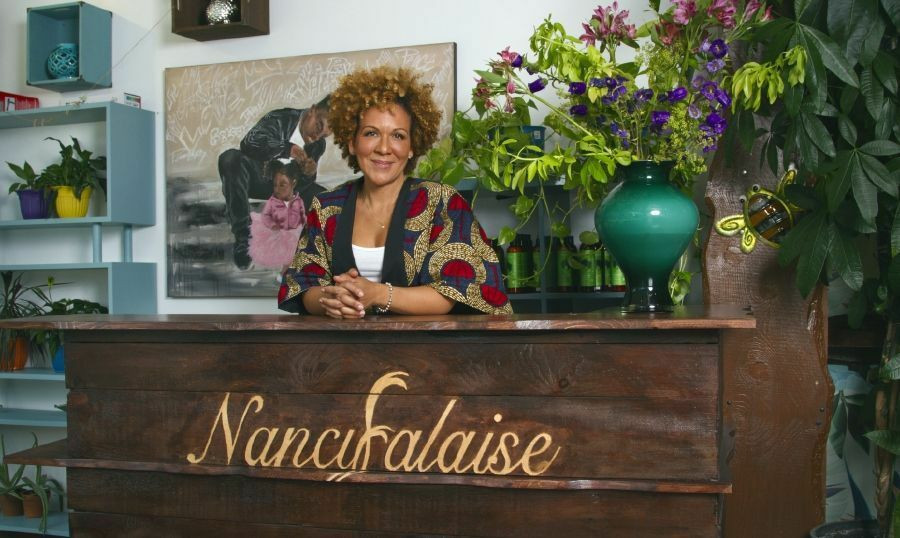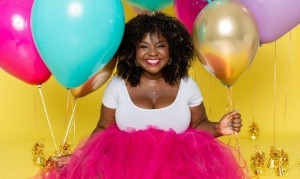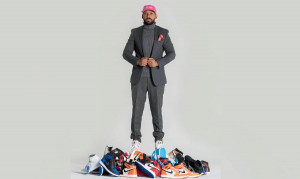Every month on a Sunday, she closes the doors of her Montreal salon Nancy Falaise Academy, to hold a workshop for young girls. It's a workshop Falaise wishes she had growing up. Attendees learn the basic skills of daily hair maintenance such as how to wash, condition, detangle, and style their hair. They also learn how using certain words to describe their hair is keeping them trapped in the cycle of a negative self image. The workshops are often filled with emotion, and lots of tears. Nancy is like that firm but loving aunty we all wish we had. She tells the girls, "It's okay to cry, there's more room outside than inside."
You grew up hating your hair and you straightened it as soon as you got your mother's permission. What made you change back to your natural hair?
I had breast cancer and lost all my hair. That was really where it started. It wasn't until I got naked because that's what happens when you have cancer, you get naked. I lost everything. I lost my hair, I lost my brows, I lost my lashes. I was basically naked. I had to look at myself and say, 'Who are you?' It was just humbling. I decided that I would never do that (perm) to my hair again, and that whatever came back, I would just work with. I decided I would learn to love myself because I didn't love myself before. When I had breast cancer I was 36 and I was the most miserable person in the world up till then. I didn't know I wasn’t loving myself. I didn't know until I got stripped down.
You speak at conferences and workshops for clients as well as hairdressers, what do you hope to accomplish with it?
I do it first of all to teach them how to take care of their hair so that they don't want to straighten it, especially permanently. It's basically to tell them that 'you don't need to have straight hair to be beautiful.' In my eyes, God makes no mistakes. If he made you with curly hair, it's because he knew that you were going to be beautiful with your curly hair. It's just that we don't know, even as black women, most of us don't even know how to maintain our hair because we weren't taught to take care of our natural hair.
We always start to either put a weave, or braids, or do a chemical relaxer. I want that to stop because a chemical relaxer is the strongest hair product out there. It's stronger than bleach, it's stronger than anything. It's the only product that can burn you at the second degree. And it's linked to fibroids. As women of colour, we are unhealthy and a lot of it stems from, one of them being, our hair. So let's be healthy and let's know that we are beautiful. So at the workshops/conferences I come with a mindset of let me teach you how to manage your hair, let me give you a self esteem boost and at the same time, I'll give you a little bit of history.
In terms of history, back then women wearing scarves had nothing to do with fashion. It started during slavery; our hair was so messed up because we didn't have access to hygiene, so we had a lot of scalp problems which led us to hide our hair. But now we wear scarves for fashion. Dreadlocks too is not just a fashion thing. The dreaded comes from an army of Africans who were called the dreaded army and they wore their locs to show their rebellion. That's where the term stems from. So the conference/workshops are like all in one. I'm teaching you a little bit of your history, I'm definitely trying to make you see that you are beautiful just the way you are, and I'm teaching you about your hair.
I went to a salon once and was told that they don't do 'my kind' of hair. Has that changed?
No, that has not changed, unfortunately, and the reason being is because they don't teach the curly hair method in hairdressing school. They do teach something about black hair/curly hair but it's just to straighten it.
What are some negative attitudes about natural hair that you have come across in the hairdressing field?
Oh my gosh, where to begin. I'm working on a project now with the government to start teaching curly hair in the hair schools. But when I first brought this to their attention about three years ago, I got completely shut down. They told me that Black people do hair among themselves. It was a very frustrating moment but I kept pushing through and they started to see that I was actually right. There is a niche. There are a lot of Black women/curly haired women that have nowhere to go. If Black women can do straight hair, why is it that white women can't do black hair. You know what I mean. Hair is hair. We should learn how to do everybody's hair not just a particular type.
Have you seen a huge change in terms of natural hair?
A huge change. People are really going back to their roots.
You go to salons to train hairdressers on how to successfully care for curly hair. What has been their response?
I've been to Switzerland quite a few times. I helped the Tribus Urbaines salon build out their salon, as well as teach their hairstylists how to style hair. I've been to London, Ontario, and I have quite a few people come to my salon and take a day class or a weekend class, and they love it. When I teach, they can't believe how easy it is. They are like, 'oh my God I didn't know it was this simple.' It's just the right tools, the right technique, the right products, and curly is just as easy as straight hair.
North American society has for a long time perpetuated lies about the afro-textured hair, and this has caused a lot of Black women to have a negative self image. What would you say to Black women who are struggling with poor self-image because of their hair?
First of all, you don't need the confirmation of somebody else to tell you that you are beautiful. There are a lot of women who are gorgeous but still feel ugly. So if you need somebody else to tell you that you are pretty, then right away there is something wrong. Hair is just the icing. Literally it's the thing on top of our head. We feel ugly in our spirit first and the hair is just where it manifests. So if you don't feel pretty with your natural hair, it's because there's another reason behind that feeling. So you have to heal the spirit to be able to heal the hair.
You have some natural hair products of your own. Tell me about that.
When I started my natural hair journey, I couldn't find anything that was appropriate for my hair and that I really liked for my hair and that of my clients. So I approached a company that already did something that I really liked. We tweaked it, added some stuff in it, some extra oils and it just became my own.
Where can people get your products outside of Montreal?
Right now we are not online yet but it's coming within the next couple of weeks. If they send us an email, we could send it. For people in Europe who want it, I have it at the salon I teach, Tribus Urbaines.
Could you give five tips on caring for natural hair?
- Wash your hair regularly with sulfate-free shampoos.
- Do a deep conditioning treatment at least once a month.
- Use oils that are moisturizing.
- Avocado
- Almond
- Castor
- Coconut and Aryan are protein oils
- Cut your ends regularly. Every three to four months you should cut your ends. Enjoy your hair. Play with it. Try stuff. Don't always wear it in the same hairstyle, always in a bun. Explore your hair texture.
- Don't wear braids and weaves repeatedly, a lot of black women suffer from alopecia due to the repeated wearing of braids and weaves.
Is it because of the pressure on the scalp?
Exactly. Let's say you wear braids for five weeks, when you take them out, your hair is in a fragile state. I like to compare it with this. Let's say you break your arm, you go to the hospital and they put your arm in a cast. The first thing they will say to you is, don't use your arm, wear it is a sling and take it easy for the next five weeks. They are not going to say, 'well now that you're hand is in a cast, carry five pounds.' So when you take out your braids and put them back in, you are giving your hair extra weight to carry around and it's already fragile. Women of colour are getting alopecia younger and younger. And the hair doesn't come back. You see a lot of beautiful women whose hairline is really, really far back. It's because of too many repeated uses of braids and weaves that are done too tight. It's called alopecia caused by traction. Imagine wearing the braids, then on top of that, we pull it back when it is heavy.
What are five words you would use to describe our natural hair?
- Beautiful
- Lustrous
- Crown
- Heaven sent
- Fabulous
Do you have any plans of coming to other cities in Canada with your workshops?
Yes. I want to go everywhere. I want to share everything that I know. The problem is that I need someone that wants to host me if I come. I have my salon here but if I go and do a worship at a salon, I want a place that will say, 'ok come and we'll gather the people.' I'll come down and do a workshop. Anybody wants me to come, I'm coming. It doesn't matter where it is.
Any advice for parents of young Black girls who may be struggling with their hair journey?
Well two things, the first being that you are your daughters first role model. So when you have a daughter and you wear your hair straight, she's gonna want to have her hair straight. Be a good model for your daughter in the sense that, if you want her to be natural, you have to start by being natural yourself. That's a big big one. Secondly, we just need to know that we are beautiful and stop trying to be something that we are not.
Lucy Oneka is a playwright and journalist. She has covered many stories for Toronto-based newspapers such as the East York Observer, the Scarborough Observer, and the Toronto Observer. Lucy’s other passion is music. She is a two-time semi-finalist of the prestigious UK Song Writing Contest and recently released her own debut gospel album, “You Are Faithful”.

 By
By 





